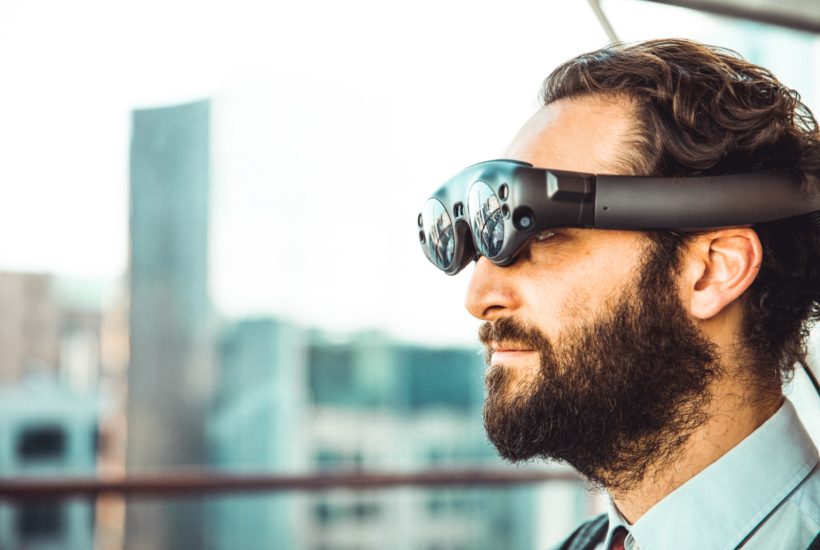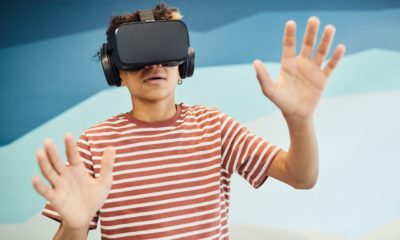Business
Augmented Reality Investment Is Heating Up: Magic Leap, XRApplied
Augmented Reality (AR) investment is seeing a lot of activity lately, with Magic Leap announcing a fresh $500 million round just this week. Combine this with the flurry of announcements coming out of companies like Facebook, and it looks like we’re at the dawn of the AR age. But, before mass consumer adoption, it looks like an enterprise age is first in line: a common theme in recent investments.

After several years of stagnation, interest in Augmented Reality (AR) investing is heating up again. Magic Leap has just raised another $500 million at a $2 billion valuation. XRApplied (CSE: XRA) has recently gone public, listing on the Canadian Securities Exchange. And even Kickstarter projects are getting a lot of attention, with French startup Lynx easily blowing past its €300k goal (currently €454k with 28 days to go) to launch its R1 headset.
This follows a busy few months on the development and product release side of things. Here we’ve seen a flurry of activity, with a highlight being the Facebook x Ray-Ban Stories smart glasses. And while these weren’t AR glasses per se, they do foreshadow a future where we’ll all be kitted out with AR-wearables. Indeed, these Ray-Ban specks are probably the ideal first “gateway drug” that the mass market needs to accept that wearing tech on your face is acceptable.
What Happened with Magic Leap this Week?
The biggest news this week is unquestionably Magic Leap’s latest investment round, which now puts the company’s cumulative funding over its seven-year history at $3.5 billion. The funding round, according to Managing Director Peggy Johnson, will allow the company greater financial flexibility, and provide it with the resources needed to continue its growth path and ensure it has the capital needed to bring its next-gen AR headset to market.
Currently, still in the work-in-progress phase (but with some prototypes already circulating), the new AR headset is expected to be released next year.
It is expected that Magic Leap will take a different market approach with its latest device. Previously, it attempted to compete with Microsoft for military contracts, but was beat out when Microsoft secured a multi-year contract (valued at up to $22 billion) to supply the Army with its HoloLens headset. Now the company is planning to shift its focus squarely towards the enterprise market.
On the technical front, the headset’s main advantages will be a class-leading field of vision, and better management of lighting than the first iteration. This will facilitate its use in brighter, outdoor environments, opening up a range of uses, like surveying and construction.
This should position the headset in a much stronger position than its previous version, which was released in March of this year. After years of military focus with just a sprinkling of consumer-focused communications, the headset has unsurprisingly languished, selling less than 10k units since its release.
XRApplied Goes Public On the CSE
This news item is now several weeks old, but it’s worth noting in the context of increased interest in augmented reality investment as it shows the rapid growth path AR companies are on now.
To illustrate this, consider that the company was incubated at the French incubator-accelerator Uniqorn just last year, where it refined its proprietary AR technologies and primed its business model for growth. Now, not much more than a year later, it has hit the public exchanges, providing early investors with a quick liquidity event, and retail investors an opportunity to participate in the growth of one of the hottest investment opportunities.
Part of what makes so compelling to investors is its proprietary software development platform. This platform allows for fast, scalable, cross-platform AR and VR development at low cost, opening up the field for businesses and institutions of all sizes—not just the most well-funded. This is of particular interest to SMEs and smaller educational institutions who, until now, have been excluded from AR largely due to budget constraints.
Thus, XRApplied is opening up entirely new markets for the enterprise AR market which — if Magic Leap’s new focus is any indication — is where the strongest demand for AR will be over the next few years. This is also where the biggest dollars tend to get spent outside of military and other government contracts, making it incredibly lucrative for firms that can get a foothold in the market like XRApplied has.
Lynx AR Headset Smashes Fundraising Target
French start-up Lynx has recently launched a Kickstarter campaign to relaunch its mixed reality AR and VR headset. Very quickly, the campaign has garnered a lot of attention and shot right past its initial goal of a €300k raise.
The headset, the Lynx-R1, which is again aimed at the enterprise market, is now positioned as a value alternative to other offerings currently on the market. Its retail price of €530 compares favorably with the Magic Leap 1, which currently sits at over $2000 a pop.
This highlights the importance of the lower-middle end of the AR market, which, until now, has largely been excluded from the enterprise space. Save for the Oculus Quest (for which there’s not a whole lot of enterprise software) and games, there hasn’t been a lot of affordable immersive tech aimed at the mass consumer market. But, as companies like XRApplied and Lynx are showing, there’s clearly a massive unmet demand waiting to snap up enterprise focused-tech as soon as it’s affordable.
The Future of Augmented Reality
With interest in augmented reality clearly heating up, it now seems that the inflection point for the adoption of AR is just around the corner. There are just too many signals — investor confidence, company RD focus, etc. — to say otherwise.
—
(Featured image by My name is Yanick via Unsplash)
DISCLAIMER: This article was written by a third-party contributor and does not reflect the opinion of Born2Invest, its management, staff or its associates. Please review our disclaimer for more information.
This article may include forward-looking statements. These forward-looking statements generally are identified by the words “believe,” “project,” “estimate,” “become,” “plan,” “will,” and similar expressions. These forward-looking statements involve known and unknown risks as well as uncertainties, including those discussed in the following cautionary statements and elsewhere in this article and on this site. Although the Company may believe that its expectations are based on reasonable assumptions, the actual results that the Company may achieve may differ materially from any forward-looking statements, which reflect the opinions of the management of the Company only as of the date hereof. Additionally, please make sure to read these important disclosures.

-

 Impact Investing2 weeks ago
Impact Investing2 weeks agoGlobal Gender Gap Progress Slows Amid Persistent Inequality and Emerging Risks
-

 Biotech4 days ago
Biotech4 days agoVytrus Biotech Marks Historic 2024 with Sustainability Milestones and 35% Revenue Growth
-

 Crowdfunding2 weeks ago
Crowdfunding2 weeks agoColombia Approves Terrenta’s Crowdfunding Platform for Real Estate Financing
-

 Africa7 days ago
Africa7 days agoCôte d’Ivoire Unveils Ambitious Plan to Triple Oil Output and Double Gas Production by 2030

























